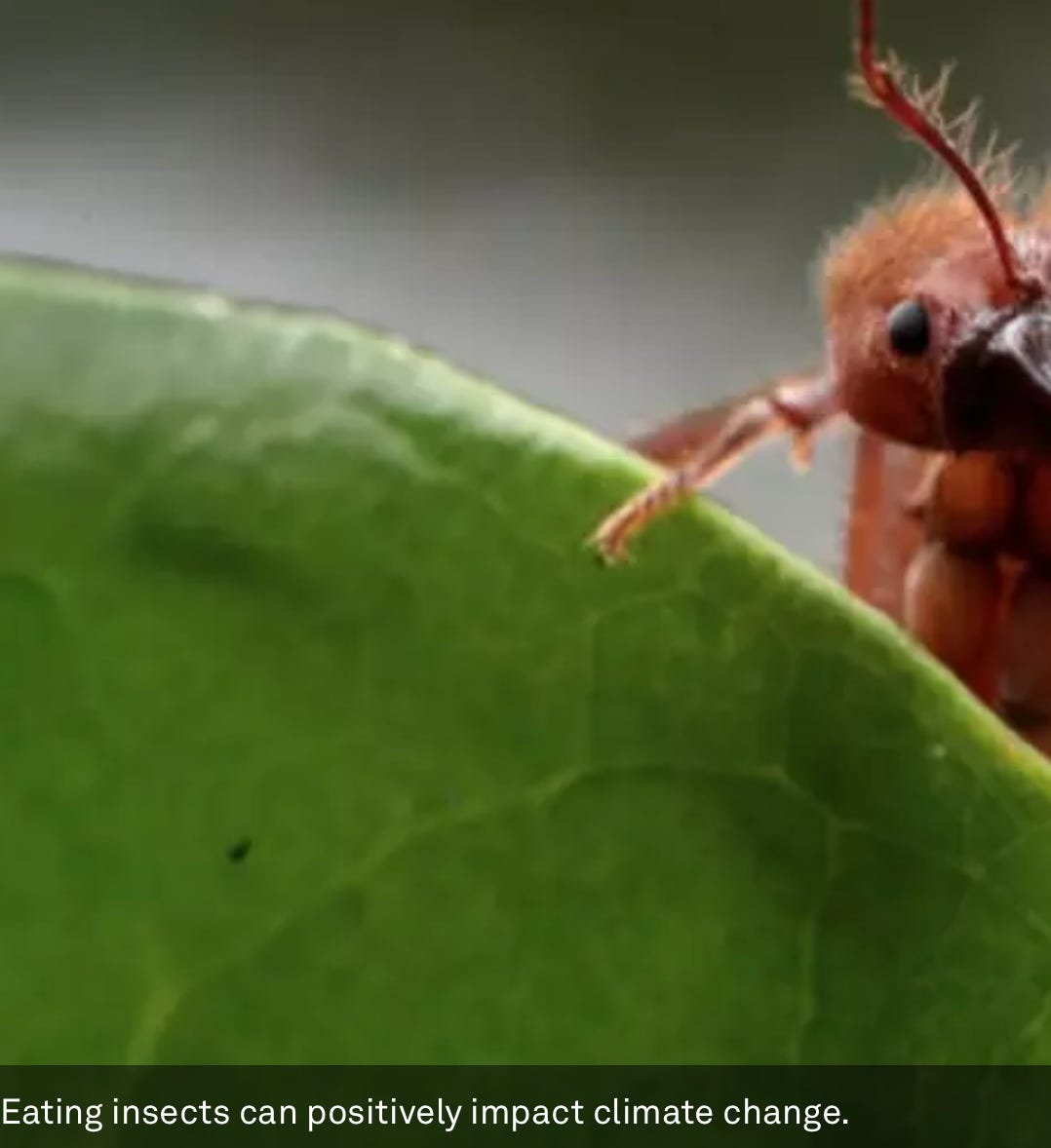https://www.weforum.org/agenda/2022/02/how-insects-positively-impact-climate-change/
I quote; note the warning against disinformation at the top:
Help us prevent the spread of disinformation
This article has been intentionally misrepresented on sites that spread false information. Please read the piece for yourself before sharing or commenting.
The World Economic Forum is committed to publishing a wide array of opinions. Misrepresenting content diminishes open conversations.
Our consumption of animal protein is the source of greenhouses gas and climate change.
Insects are an overlooked source of protein and a way to battle climate change.
The consumption of insects can offset climate change in many ways.
We've been conditioned to think of animals and plants as our primary sources of proteins, namely meat, dairy and eggs or tofu, beans and nuts, but there's an unsung category of sustainable and nutritious protein that has yet to widely catch on: insects.
Before you say "yuck," hear us out.
Most of us aren't accustomed to regarding insects as food. But, the nutritional difference between sources of protein is relatively small. For instance, plant proteins lack some essential amino acids that animal proteins possess, but the major differences between insect and other sources of protein exist largely in the cultural and environmental realm.
Have you read?
How to create a more sustainable global food system in the wake of COVID-19
How to build sustainable, healthier, more equitable food systems
Good grub: why we might be eating insects soon
Mainly, we are accustomed to regarding insects as beneath our palate.
But consider five reasons why insects are an excellent alternative source of protein and significantly reduce our carbon footprint.
1. Edible insects can produce equivalent amounts of quality protein when compared to animals.
A recent study showed that insects offer between 9.96 and 35.2 grams of protein per 100 grams, compared with between 16.8 and 20.6 grams for meat.
Of course, not all insect protein is created equal. For instance, crickets, certain ant species and mealworms are known to be protein and calorie dense stars in the insect-consumption world. One easy way of integrating insect protein into your diet would be through cricket protein powder, used in the place of your typical protein supplement powder.
2. Insects require less care and upkeep than livestock.
The argument that insects are a good source of protein is compounded by the fact that their production uses considerably less resources (less land, less feed, less water, less transport fuel and less human labor) than animal livestock while possessing a much smaller carbon footprint.
Plants, on the other hand, do not produce greenhouse gases. However, they do require land and machinery use, water use, manufacturing, processing and transportation, among other matters -- all, during which, carbon is emitted.
It's critical to consider how to lower our carbon footprint and make a difference in climate change through our understanding of how food goes from the source to our mouths.
3. We're actually running out of protein.
By 2050, the earth will have nearly 10 billion people. The demand for protein will exceed our ability to procure it.
That's a scary thought. Protein is the workhorse of the human cell. Without it, the body cannot produce some of the essential amino acids we need to live.
For our long-term survival, we're going to need to increase our food output and decrease our carbon emissions at the same time.
The answer requires real innovation about food production and what we think about food.
“By 2050, the earth will have nearly 10 billion people. The demand for protein will exceed our ability to procure it.”
— Amrou Awaysheh and Christine J. Picard
4. Insects are part of a virtuous eco-cycle.
Imagine this: Insects feeding on organic materials from other processes, such as spent grains from brewery operations, thus preventing additional waste from going into landfills, and providing added value to the brewery and feed for the insects.
This is called circular agriculture, diverting materials from landfills, which produce 20% of the global anthropogenic methane emission and are the second highest producers of greenhouse gas. Using insects as inputs for another function closes the cycle and also positively impacts climate change.
This circular value chain will continue to help decrease emissions, as disposed organic materials no longer end up in landfills, producing methane and other harmful gases in the process.
WEF not the only ones.
And it’s not just notional, as a commenter on this article pointed out ( I love the robust debate in the comments, by the way - it’s great keep it up! ) : it’s a big part of the developing environmental mindset; the WEF are not the only ones recommending this idea.
The Aspire food group in Canada is already producing cricket meal:
Crickets are Kosher by the way; and they are eaten in the New Testament by John the Baptist.
But the University of Queensland wants to put maggots in burgers, which is definitely not Kosher:
https://stories.uq.edu.au/research/2023/flies-as-food/index.html
And note my previous article: they have already been putting cricket meal into kids’ lunches at schools in Australia:
Fact check: eat ze bugs, kids!
https://www.news.com.au/national/snacks-containing-bugs-have-been-introduced-to-1000-school-canteens-across-the-country/video/f2b1b572d243ea40d3d3dab7e3a8dded They’ve already started feeding insects to kids in Australia. Eat ze bugs kids! FirstFactCheck is a reader-supported publication. To receive new posts and support my work, consider becoming a free …





WEF completely out of touch. let's see them try this shit
While we are reduced to eating bugs, plant based "meats" and mystery lab grown meat the W.E.F. and so called world elites will continue to dine on normal farmed meats.
We will not have a say in this.